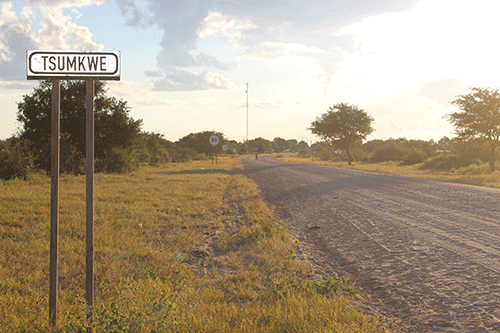Lahja Nashuuta
The poor road network, insufficient electricity coverage and water shortage are some of the challenges holding Tsumkwe back, the constituency’s councillor Johannes Haufiku has said.
Situated in Otjozondjupa region, Tsumkwe constituency is endowed with numerous tourism attraction sites that includes the N#a Jaqna and Nyae Nyae conservancies which house all sorts of wildlife, including the big five.
However, the constituency has not been able to benefit fully from its natural endowment.
The blame is squarely placed on the poor road infrastructure. Tsumkwe has one of longest bumpy and dusty gravel roads in the country, which stretches about 300km.
“We have three richest conservancies that house all sorts of wild animals, including the big five and it is because of them that tourists are flocking here. However, these gravel roads are really discouraging them to come back,” Haufiku said.
According to the councillor, roads that connect Tsumkwe through Rooidag Gate to Grootfontein and then proceed to Gam through Dobe Border Post, are in a state of despair. As a result, the constituency is losing out on the economic front.
“I always receive feedback from our visitors and tourists expressing their concerns with regards to our road network and pleading with us to fix it. Besides, we have lost so many lives on this long gravel road as there is lots of wildlife,” Haufiku lamented during a recent interview with New Era.
According to Haufiku, the gravel road becomes deadlier during the rainy season, as it becomes slippery, leading to accidents and fatalities.
Despite promises to upgrade the road, not much has been done on the ground, he complained.
“There was a study carried out by the Roads Authority in 2020. But we were informed that tarring of the Tsumkwe-Grootfontein gravel road is not viable since the amount of traffic on the road does not justify the expense,” a disappointed Haufiku said.
Home to the San, one of Namibia’s marginalised communities, Tsumkwe, he said, is lagging behind in terms of socio-economic development and its inhabitants do not have access to basic services such as shopping malls, clean water and electricity.
Currently, there is only a small village store, with petrol pumps located at the entrance to the settlement.
Another challenge, he said, was the alarming rates at which learners are dropping out of school, poverty and unemployment.
“We have two secondary schools, Gam Secondary School, and Tsumkwe Secondary School. But the pass rate has been disappointing ever since. Only few learners passed grade 11 and 12, which makes it difficult for them to be absorbed in government jobs, for example in the army or police,” he said.
He revealed that since most of the students are from the marginalised community, the constituency office is currently engaging the government to relax the entry requirements for both government jobs and university acceptance to make provision for the marginalised community to penetrate the job market as well as institutions of higher learning.
Besides that, Haufiku said: “I understand that Namwater and the Ministry of Agriculture, Water and Forestry are supposed to make water available for our inhabitants, but as I am speaking, there is no water in Tsumkwe and surrounding areas.”
On electricity provision, he said the settlements currently rely on a mini-grid system, which does not have sufficient capacity to cater to the demands of the two settlements, adding that insufficient electricity supply hampers the smooth operation of businesses.
On a positive note, the councillor revealed that the United Nations World Food Programme has signed an agreement with the Otjozondjupa Regional Council to set up a vegetable garden in Tsumkwe.
The garden, which is aimed at addressing poverty, food and nutrition insecurity, is expected to create hundreds of jobs for the youth in the region.
– lnashuuta@gmail.com


